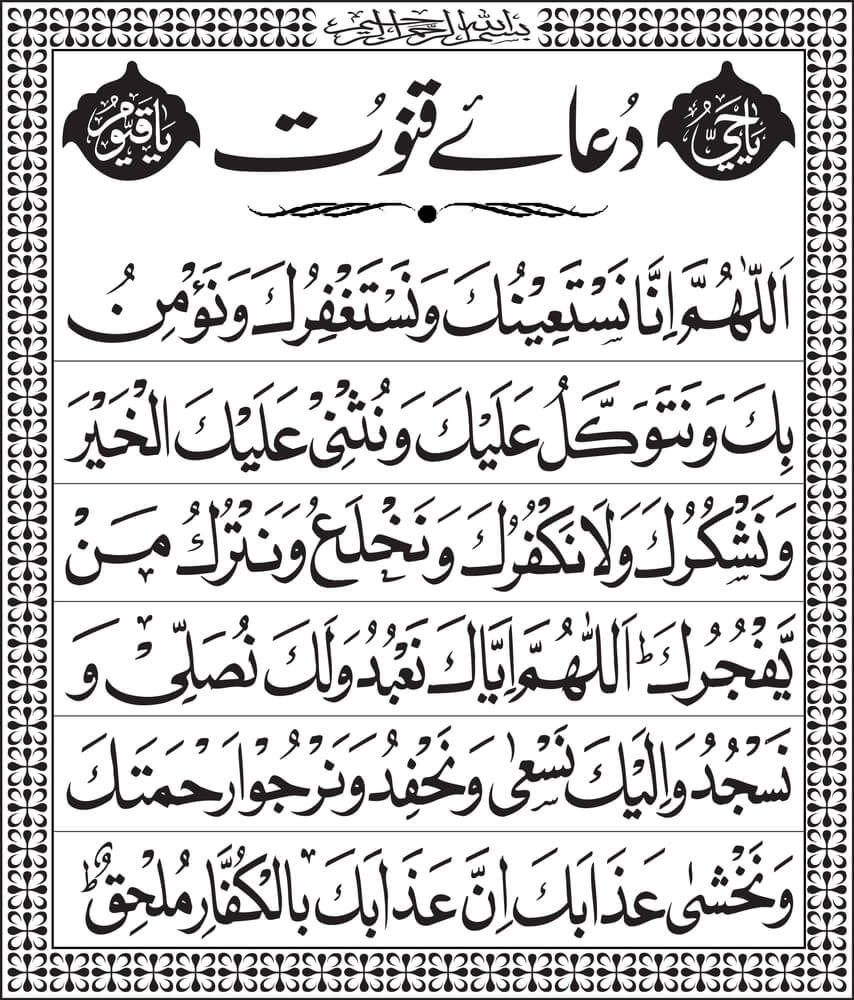Dua e Qunoot | English Translation & Transliteration

What is Dua e Qunoot:
Qunoot is the word derived from “Kanata” which means standing humble and quiet in front of Allah. Dua e Qunoot or The Witr prayer is a special supplication that is often recited in the Witr Sala of Namaz e Isha. It was firstly recited by Muhammad (SAW). Reciting the Witr prayer is not mandatory for Muslims but it is a Sunnah act, so one must recite it for its benefits and blessings.
Dua e Qunoot states that:
اَللَّهُمَّ إنا نَسْتَعِينُكَ وَنَسْتَغْفِرُكَ وَنُؤْمِنُ بِكَ وَنَتَوَكَّلُ عَلَيْكَ وَنُثْنِئْ عَmuslلَيْكَ الخَيْرَ وَنَشْكُرُكَ وَلَانَكْفُرُكَ وَنَخْلَعُ وَنَتْرُكُ مَنْ ئَّفْجُرُكَ اَللَّهُمَّ إِيَّاكَ نَعْبُدُ وَلَكَ نُصَلِّئ وَنَسْجُدُ وَإِلَيْكَ نَسْعأئ وَنَحْفِدُ وَنَرْجُو رَحْمَتَكَ وَنَخْشآئ عَذَابَكَ إِنَّ عَذَابَكَ بِالكُفَّارِ مُلْحَقٌ
It can be translated into English as:
O, Allah! We invoke you for help and beg for forgiveness, and we believe in you and have trust in you and we praise you, in the best way we can; and we thank you and we are not ungrateful to you, and we forsake and turn away from the one who disobeys you. O, Allah! We worship you and prostrate ourselves before you, and we hasten towards you and serve you, and we hope to receive your mercy and we dread your torment. Surely, the disbelievers shall incur your torment.
Dua e Qunoot with Urdu Translation:
The Urdu translation of the Qunoot Dua states that:
اے الله ! ہم تجھ سے مدد مانگتے ہیں اور تجھ سے معافی مانگتے ہیں اور تجھ پر ایمان رکھتے ہیں اور تجھ پر بھروسہ کرتے ہیں اور تیری بہت اچھی تعریف کرتے ہیں اور تیرا شکر کرتے ہیں اور تیری نا شکری نہیں کرتےاور الگ کرتے ہیں اور چھوڑتے ہیں اس سخص کو جو تیری نافرمانی رے۔ اے الله! ہم تیری ہی عبادت کرتے ہیں اور تیرے ہی لئے نماز پڑھتے ہیں اور سجدہ کرتے ہیں اور تیری ہی طرف دوڑتے اور رجوع ہیں اور تیری رحمت کے امید وارہیں اور تیرے عذاب سے ڈرتے ہیں، بیشک تیرا عذاب کافروں کو پہنچنے والا ہے
Click on the link for Dua Qunoot PDF
Benefits of Reciting the Dua e Qunoot:
The benefits of reciting this supplication are:
- It brings an individual close to Allah
- Makes a believer realize that Allah is their only supporter
- It tightens one’s belief
- Protects a Muslim from evil eyes
Importance of Reciting The Witr Prayer:
By reciting this supplication, a believer condemns that he can be helped by none other than Allah, he presents himself against Allah and begs for forgiveness from Him. This dua highlights the praise and mightiness of Allah who is alone the Sustainer & Holder of this universe and who is alone the worth of all the praises and worships. Furthermore, the traits of the Qunoot Dua tightens a belief of a Muslim towards Allah and helps him to repel away from sins.
How to recite the Dua Qunoot?
The Dua Qunoot is recited in different prayers such as Fajar, Maghrib, and Isha but most probably it is recited in the Witr prayer of Isha. It is not obligatory to recite it in the Witr Salah, except this many other Dua’s can be recited, but reciting the Dua e Qunoot is the Sunnah act that the Muslims must attempt to observe
Many misconceptions exist that either this Dua must be recited before the Rukuh or after the Rukuh, so according to many authentic sources, it is clarified that the Dua Qunoot must be recited before going to Rukuh. It is recited in such a way that before bowing (Rukuh) in third Rakah, one raises his hands for Allah hu Akbar and recites the following Dua, and after completing the supplication one performs Rukuh.
Dua Qunoot in the light of Hadiths:
It was narrated from Ubayy bin Ka’b that: The Messenger of Allah (SAW) used to pray Witr with three rak’ahs. In the first, he would recite: “Glorify the Name of Your Lord, the Highest” in the second: “Say: O you disbelievers!”, and in the third: “Say: He is Allah, (the) One”. And he would say the Qunut before bowing, and when he finished he would say: Subhanal-Malikil-Quddus (Glory be to the Sovereign, the Most Holy) three times, elongating the words the last time. Sahih (Darussalam) Sunan an-Nasa’i 1699



